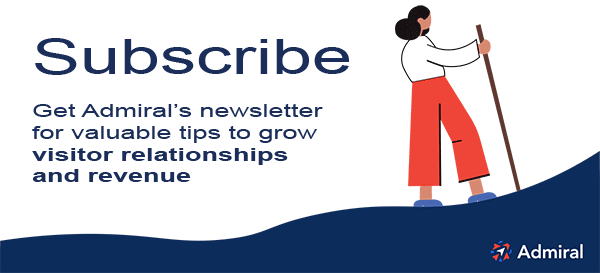Recently, Google announced a new policy affecting publishers serving EU-based audiences. In order to continue utilizing Google’s monetization tools with EU audiences, publishers must now only partner with platforms that adhere to the latest version of the Transparency Consent Framework (TCF), an industry-wide privacy agreement.
Admiral was one of the first 10 IAB-certified CMPs in the world and is happy to share that we’re also a Google-certified CMP provider.
This change affects publishers using Google AdSense, Ad Manager, and/or AdMob to serve EU-based audiences, where the General Data Protection Regulation (GDPR) mandates that publishers and their partners in the advertising ecosystem respect specific privacy regulations.
The TCF was developed by a group of online advertising businesses headed by the European arm of the Interactive Advertising Bureau (IAB) to help them comply with the GDPR, but it hasn’t been without its share of problems in the five years (nearly to the week) since the law’s enforcement started.
See also: TCF 2.0 Frequently Asked Questions
Earlier this week, Google’s director of product management, Peentoo Patel, confirmed this new policy, noting that the change was made in reaction to the completion of TCF 2.2 and that Google will be announcing a list of consent management platform (CMP) providers that have been approved by the company in the coming weeks.
Patel attempted to elaborate on the decision, stating, “When we do this, we’re thinking about evolving user expectations and regulatory indicators that we think will ultimately guide the broader online advertising landscape. We anticipate others in the industry will follow with similar adjustments.”
Google has started compiling an index of approved CMPs but has been unable to provide an updated list of TCF-compliant vendors. However, a Google representative has promised that the company would begin to release regular updates of this latter list shortly.
(Admiral is one of the first IAB TCF-compliant CMPs.)
CMPs interested in applying for certification or learning more about its approval process can do so through a Google registration form. “We’ll continue to support publishers who use the TCF, but also work with ad tech providers that aren’t registered with the TCF through our Additional Consent specification,” stated Patel.
Though the procedure is simple on the surface, experts have raised several red flags, most notably regarding the possibility for the change to incur extra costs.
In a recent interview, digital media and ad tech consultant Emily Palmer warned that if Google rejected one of the large industry CMPs, over-taxed publishers could face significant pains and that any such platform provider would be put on notice.
“It will be interesting to see whether Google considers criteria such as the CMP’s track record of respecting publisher and user data based on different purposes,” she said. “There’s a line Google has in mind, which they won’t want to cross in terms of becoming a legal or ethical arbiter.”
Jana Meron of Lioness Strategies pointed out how many publishers would have to figure accounting for this change into their already growing list of expenses.
“This is important, but it also adds to publishers’ ongoing concerns… the notion of consent is getting trickier and trickier,” Meron added. “This can push more and more people into a bloated ad tech environment that can hurt premium publishers.”
See also: Privacy Consent Management FAQ
How Might These Changes Affect Established Publishers?
Ad income from users in the UK and the EEA could be impacted negatively as a result of this change.
Essentially, there are two possible scenarios for which the outcomes are currently unclear. In the first scenario, publishers may choose to disobey Google’s guidelines. In the second scenario, publishers would use Google-approved CMPs to implement TCF, but users may not provide their consent. In both cases, it would be logical to assume that Google would then serve non-personalized ads (NPA) rather than personalized ads (PA).
According to data analysis group NewZoo, by 2022, mobile devices will account for roughly half of all income worldwide for certain publishers. About 12% of this will be attributed to Europe. While hard numbers are lacking, it’s probably safe to infer that Europe contributes a percentage of ad income about equal to that of in-app purchases (IAP).
The proportion of a publisher’s earnings that come from this affected area will determine how they’ll prioritize the work involved and how quickly they’ll align themselves with the new regulations. Additionally, Google and others may decide it’s in their best interest to eventually implement these same standards internationally.
Google's Timeline and Certification Process
May 2023 and onward: Google has begun the process of certifying CMPs that work with affected publishers. Google will work with CMPs to certify them against the certification criteria.
According to the available information, this change will be implemented “later this year.” Given the magnitude of this shift and the potential fallout it may cause if publishers aren’t given enough notice, it seems unlikely that Google would begin strictly enforcing this policy until at least the fourth quarter of this year.
Need a reliable CMP that Meets Google, GDPR, and IAB requirements?
Admiral is a Google-certified CMP provider and was one of the first IAB TCF-approved on the market.
- Configurable messaging and consent types to maximize transparency and conversion
- Targeting and segmentation including location-based and site-specific traffic
- Reporting to help monitor conversion tracking and GDPR revenue impacts
- The first adblocker-aware consent solution
- Cross-platform support including mobile web
- Flexible pricing options with real live experts to speed network rollouts
What Admiral's Google-approved status means for you:
- Customers that are currently using Admiral’s CMP: Great news, you’re all set!
- Customers that are actively using any one of Admiral’s modules: Our Customer Love team can turn on and configure your CMP in minutes.
- For publishers looking for a Google-certified CMP: Schedule a demo today.





